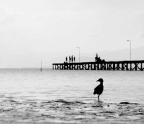He Who Fishes
 Photo by Spring Fed Images via Unsplash
Photo by Spring Fed Images via Unsplash In our village, boys were not given surnames at birth. Instead, naming ceremonies were held on their fifteenth birthdays. On that day, a boy would demonstrate aptitude in any skill he wished. Our village elders judged his efforts and granted a name if he showed sufficient proficiency. If his performance was deemed poor, he would remain nameless for another year. I knew many incompetent boys who fled our village to avoid that shame.
My father’s father was named Tsgnorsian, or “he who fishes.” Ever since he was a young man, rumors had circulated, even as far as Baku, about the restorative powers of the fish that he caught. People said that if you ate a fish caught by my grandfather, it could cure illness and increase stamina. Even the Ottomans patrolling our village used to pay for Tsgnorsian’s fishes. Our village elders would boast that they had known Tsgnorsian was gifted from a very early age. My grandfather was an orphan from Tarsus, which is where everybody said the gods lived. His mother, supposedly, had been Astghik, the water goddess. My grandfather never confirmed these stories, but he never corrected them either.
My father and his younger brother knew that they would be deemed unworthy as fishermen compared to their father, and when they came of age, they chose to pursue hunting. In the winter they sought out fur, or the hides of deer and goats. In the summer, it was smaller animals, like raccoons, and sometimes even otters. My father was named Gaitzagian, or “strikes like lightning,” and his younger brother was Makoormortian, or “clean scalper.” When they were boys, my father and his younger brother made a pact: if either of them had a son, then he would be the one to take on the title of Tsgnorsian. By that time, they reasoned, their father would be too frail to continue claiming ownership of the name, and the family pride could be carried on to another generation. But something peculiar happened: as their father aged, he became even better at catching fish. My grandfather said that his vision worsening had forced him to adopt a firmer grip, and that his eyes had been holding him back. He never allowed anyone else into his boat with him, but I used to watch him many times from the lakeshore. The gray tufts above his eyes were furrowed together in one long, unbroken line. He was still as a
You’re reading a preview, subscribe to read more.
Start your free 30 days





